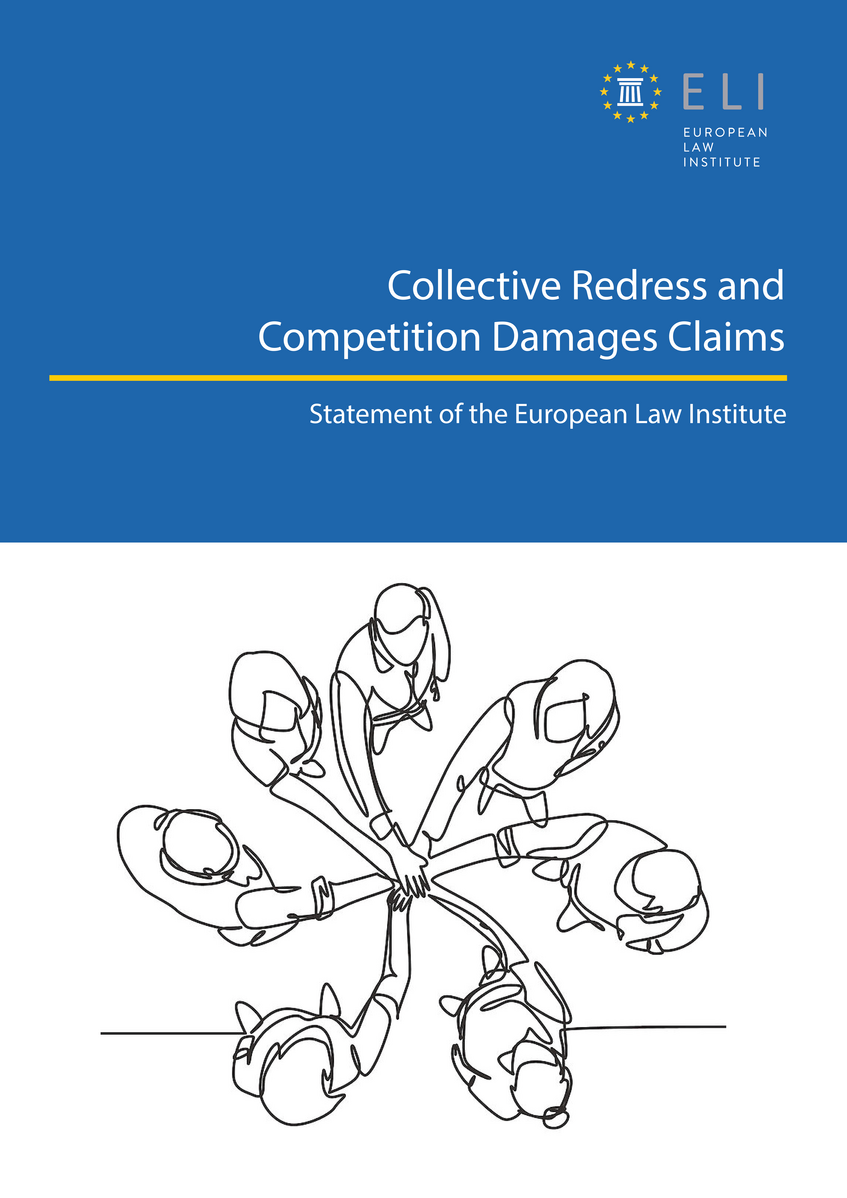ELI Statement Collective Redress and Competition Damages Claims
Summary
The project assessed the Commission's Recommendation on common principles for injunctive and compensatory collective redress mechanisms in EU Member States concerning violations of rights granted under Union law, identified its implications and suggested practical improvements, in the form of recommendations, for the purpose of a coherent implementation. The output entailed an assessment of the Commission proposal for a Directive on certain rules governing actions for damages under national law for infringements of the competition law provisions of EU Member States.
Introduction
In accordance with Article 12(4) of the Statute, the Executive Committee appointed Mark Clough as a project leader, who conducted the project with the other members of the project team.
Outline
The project is an assessment of the Commission's Recommendation on common principles for injunctive and compensatory collective redress mechanisms in EU Member States concerning violations of rights granted under Union Law. Its aim was to identify its implications for Member States and suggest practical improvements for the purpose of a coherent implementation. Furthermore, this ELI Statement contains an assessment of the European Commission proposal for a Directive on certain rules governing actions for damages under national law for infringements of the competition law provisions of the Member States and of the European Union, while also taking into account the Communication on quantifying harm in actions for damages based on breaches of Article 101 or 102 of the Treaty on the Functioning of the European Union.
Background
On 11 June 2013, after years of deliberation on the subject of collective redress, the Commission issued a non-binding Recommendation which prescribes that all Member States should have collective redress mechanisms in place for all areas of Union law conferring rights and obligations on individuals and legal entities (as many currently do not) and outlines several principles to which such mechanisms should adhere. This subject is of particular importance in the field of competition law, as anti-competitive practices can often result in relatively small amounts of damage to large groups of consumers. Consequently the proposal for a Directive dealing with actions for damages in antitrust cases, issued on the same day, clearly complemented the Recommendation. It introduced various significant measures such as a rebuttable presumption that any cartel infringement has caused harm, a power for national courts to order the defendant or third parties to disclose evidence, and the recognition of infringement decisions by national competition authorities before every national court in the EU. The proposal was accompanied by a Communication and a Practical Guide on how to quantify harm in antitrust cases.
The Directive was approved by the European Parliament (17 April 2014) and the Council (10 November 2014), and published on the Official Journal of the European Union on 5 December 2014.
Development
The Working Group held meetings in Vienna and Brussels in October and November 2013. At these meetings various provisions of the proposals, such as disclosure of evidence, the protection of corporate leniency statements in competition damages cases, and quantification of harm or funding of compensatory collective redress were discussed. The second meeting was attended by representatives of the European Commission, who provided insight on the rationale behind the Commission‘s proposals as well as on the status of the legislative process.
Another meeting took place in January 2014, after which a first draft of the ELI Statement on Collective Redress and Competition Damages Claims was reviewed by the Advisory Committee.
The draft Statement was also a subject of discussion at one of the panel session at the ELI 2014 Projects Conference in Zagreb. The leader of the project, Mark Clough, and another member of the Project Team, Yannis Avgerinos, presented the outcomes of the work to the conference participants and together with the other prominent experts in the field discussed the latest developments.
Project Leader
- Mark Clough QC
Project Team
- Yannis Avgerinos
- Erdem Büyüksagis
- Duncan Fairgrieve
- Fernando Gascón Inchausti
- Ulrich Magnus
- Ken Oliphant
- Tommy Pettersson
- Denis Philippe
- Anne-Lise Sibony
- Astrid Stadler
- Ianika Tzankova
- Gerhard Wagner
- Diana Wallis
Advisory Committee
- Henrique Sousa Antunes
- Herman Cousy
- Andrea Giussani
- Assimakis Komninos
- Koen Lenaerts
- Henrik Øe
- Walter Stoffel
- Nils Wahl

